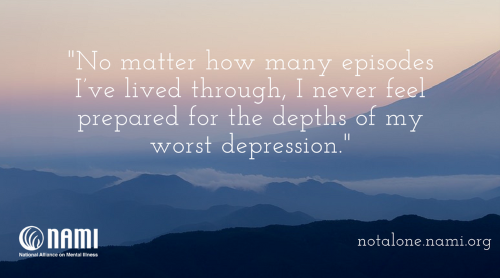November 03, 2017
By Seamus Kirst

No matter how many episodes I’ve lived through, I never feel prepared for the depths of my worst depression.
As the depression slips in, I often feel sad. I begin to cycle thoughts of disappointment, but it is manageable.
But, the sadness normally doesn’t last very long. It gives way to something much more terrifying: an utter sense of emptiness.
Then suddenly, I know the bottom has fallen out, when I feel a physical and emotional sense of numb. It suddenly feels as though everything in my life is wrong; it feels like every decision I have ever made was the wrong one, and that I suddenly am an imposter in the life I built for myself. I know I am depressed when I am not panicking from this feeling, but rather am tempted to give in to it—to accept that I may live a life characterized by an everlasting sense of disappointment.
Worst of all is when the feeling of being stuck behind the plexiglass sinks in. It suddenly feels like I am physically being pulled back into my body; the outside world feels so much further away and the only thing that feels near are my negative, looming thoughts. People I love suddenly feel like familiar strangers. I remember what it looked like when I enjoyed being around them, when I knew how to relate to them, but in these periods, all my interactions become forced.
When I am behind the plexiglass, even the simplest of tasks feel daunting. Whether it’s sending an email, doing my laundry, calling a friend or even eating, I suddenly notice that I have to will myself to do something that would normally come completely naturally. The concept of an activity, interaction or accomplishment bringing me joy feels near impossible. When I am at my lowest, everything feels like a chore…empty obligations.
I’m having an episode right now. People who don’t suffer from depression often seem confused when I try to explain the bizarre intermingling of psychological and physical symptoms. I do not know how to better describe it than to say that at my lowest, I feel like my soul has the flu. I wake up in the mornings exhausted, regardless of how much I sleep. Most of the day, I feel lethargic, but at night, sleep won’t come.
I hate when I get to this place; I hate when it feels like the other side is so far away, even though I know that I always get there. It is hard not to feel discouraged when everything feels so devoid of significance—when no matter how much I achieve, or how fortunate I know I am, I cannot convince myself to feel content, or sometimes to even feel okay.
When I am behind the plexiglass, I want to be alone. I want to isolate, and to allow my worst thoughts, insecurities and doubts to cycle, until their presence is no longer alarming, but rather just is.
But, I always have to remind myself of the way my mind works when I am not here; of the way my mind works when happiness does not seem as near impossible of obtaining as a unicorn.
I don’t want to see anyone, I think.
But you have to, I tell myself.
I want to stay up all night and then sleep all day, I think.
That will only make you feel worse, I tell myself.
I want to just stop for a bit. I want to do nothing, and think nothing and feel nothing, until this passes. I want to wait it out, I think.
You have to push yourself through, I tell myself. You have to work to get out of this; you have to fight the illusion of a permanent void within yourself.
So I fight: I drag myself to yoga when I feel as though I can barely muster the strength to lift my head and I talk to my friends when I want nothing more than to lock myself in my room for a week. I keep taking my antidepressants and making myself eat real food and sitting beneath my bright light therapy lamp, no matter how ridiculous it sometimes makes me feel.
I remind myself of what used to happen when I didn’t acknowledge I was depressed; when I didn’t honestly speak about the fog that set in. I remind myself of the alcoholism, of the suicide attempts, of the ever-present instability. I remind myself I don’t want to be in that place; that I won’t ever again be in that place.
So I write; I write about the feelings that I force myself to remember are still there, beneath the numbness. I write about the feelings that I recognize I yearn for; the feelings that always eventually come back when I put up my best fight for myself and the plexiglass again disappears.
Seamus Kirst is the author of a memoir, Shitfaced, about mental illness and addiction. He is the co-host of the Mental Health Hangouts podcast.
Follow @SeamusKirst on Twitter, and like his page on Facebook.
Submit To The NAMI Blog
We’re always accepting submissions to the NAMI Blog! We feature the latest research, stories of recovery, ways to end stigma and strategies for living well with mental illness. Most importantly: We feature your voices.
LEARN MORE